Anyone in the Münster/Westphalia region who has to deal with diseases of the abdominal organs turns to a name that is well-known in the surrounding area: Münster University Hospital "stands for cutting-edge medicine and is one of the most successful maximum-care providers in the country", as the UKM emphasises. The Northwest German Abdominal Centre, which is affiliated with the Clinic for General, Visceral and Transplant Surgery, enjoys a special reputation. The abdominal centre and clinic are part of the West German Tumour Centre (WTZ), network partner Münster. The clinic, like the centre, is headed by a highly specialised physician who treats all diseases of the liver, pancreas, oesophagus, intestine and stomach with university-level expertise – Univ.-Prof. Dr. med. Andreas Pascher.
The Northwest German Abdominal Centre is considered a pioneering institution for all diseases in the abdominal cavity – and a prime example of contemporary high-performance medicine. When Univ. Prof. Dr. Andreas Pascher became Director of the Department of General, Visceral and Transplant Surgery at Münster University Hospital in 2018, the tradition-rich hospital entered a new era of abdominal surgery. The clinic director brought some new ideas from time he previously spent at the Charité hospital in Berlin.
For Univ. Prof. Pascher, the patients are at the forefront of all medical considerations. This is why he almost always uses minimally invasive surgical techniques even for complex procedures: Whether it is difficult operations on the pancreas or oesophagus, the treatment of liver cancer or stomach surgery – he always makes a point of proceeding as gently as possible on the organs and using his surgical skills to keep the length of people’s stay as short as possible.
Gastrointestinal tract: Trend-setting surgical procedures
People in the Westphalian region benefit from the innovative surgical methods, for which Univ. Prof. Pascher also likes to use robotic support, for a number of reasons. The high level of expertise at the UKM Robotics Centre and the surgical precision achieved as a result lead to improved prognosis and organ protection, as well as a reduction in pain and healing times. Particularly in delicate operations on the oesophagus, liver or pancreas, for example, the sophisticated robot technology acts as an arm-extension for the specialist. The head of the clinic and his team also benefit from navigation aids and assistance systems, which allow him to operate with millimetre precision while setting new standards time and again. The clinic director and his team use gentle surgical techniques for all diseases of the abdominal cavity – both benign and malignant. In the case of cancer, one of Prof. Dr. Andreas Pascher’s other specialities comes into play: He is also considered an absolute luminary in rare tumour diseases of the gastrointestinal tract and one of Europe’s leading surgeons in the field of neuroendocrine tumours. He also has a lot of experience in reconstructive surgery of the abdomen and intestinal rehabilitation. The clinic is one of only a few in Europe to offer a complete visceral transplant programme. Besides liver and kidney, pancreas and intestine are also transplanted. The clinic is also one of the most active clinics in Europe when it comes to researching machine perfusion to preserve and improve post-mortem donated organs before organ transplantation.
Visceral Oncology Centre: Treatment of cancer in regional and national cooperation
For cancers of the gastrointestinal tract, Münster University Hospital is certified as a Visceral Oncology Centre. The Northwest German Abdominal Centre and the Visceral Oncology Centre belonging to it, both headed by Univ. Prof. Pascher, work very closely with partners in the region and beyond. For complex and advanced cancers of the abdominal organs, a second-opinion portal was set up, located in the newly created North Rhine-Westphalia virtual hospital, to answer questions on the operability (resectability) of liver tumours and liver metastases. Alongside all the minimally invasive and robotic surgical procedures, the Department of General, Visceral and Transplant Surgery also offers all kinds of open complex surgical procedures for extended liver and pancreas operations. These include procedures with complex vascular reconstructions and two-stage procedures in liver resection, such as the so-called ALPPS technique.
As a contemporary high-performance physician, interdisciplinary and interprofessional cooperation plays a major role for Univ.-Prof. Pascher. The expertise of top-class cooperation partners in gastroenterology, hepatology, nephrology, endoscopy oncology, radiation medicine, interventional radiology, pathology and other important partners in the West German Tumour Centre, the German Visceral Transplant Centre and the UKM Robotics Centre is available at the UKM to this end. Particular attention is paid to the future-oriented development of cooperation with the nursing professions, especially in the fields of oncology and transplantation medicine. The clinic, headed by Prof. Andreas Pascher, assumes a pacemaker function for the development of interprofessional projects within the framework of the Magnet Hospital at the UKM.
Research, teaching, practice: Pioneering the future of medicine
Prof. Dr. Andreas Pascher's approach to university medicine also includes research and teaching. He is involved in both theoretical and practical training, for example in teaching organ-preserving surgical techniques or in training with the VR simulation trainer for laparoscopy and robotics. Within a very short time, the robotics centre has developed into an international observation centre where colleagues from other hospitals receive training. The most cutting-edge studies on cancers of the liver, pancreas, upper gastrointestinal tract and intestine are offered in the environment of the WTZ site in Münster. Prof. Pascher is co-responsible for developing more than 20 international guidelines in the field of neuroendocrine tumour diseases and has helped to establish the position of European consultant for neuroendocrine-oriented specialists. The specialist also has the coming generations of medical professionals in mind when it comes to transplant surgery: For him, the need for donor organs is one of the key issues that needs addressing in the future, which is also reflected in his research. For example, he is working on the machine perfusion of liver and kidney, the production of artificial organs and the regeneration of existing organs by means of cell transplantation. For his scientific achievements in the field of small bowel and multivisceral transplantation, he received the Von Langenbeck Prize, the highest award of the German Society for Surgery, in 2017.
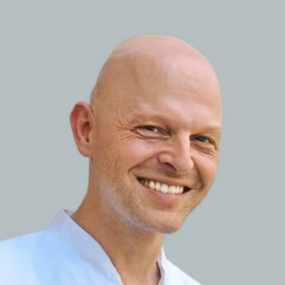
Universitätsklinikum Münster
Specialist in liver surgery, pancreatic surgery, gastric, intestinal and oesophageal surgery, oncological and robotic surgery in Münster
Waldeyerstraße 148149 Münster
+49 251 97159021
(Landline at local rates)

+49 251 97159021
(Landline at local rates)
Our doctors
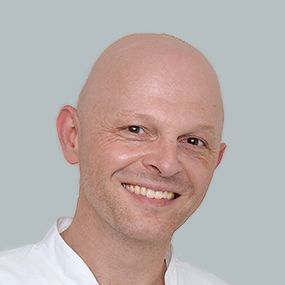
Univ.-Prof. Dr. med. Andreas Pascher
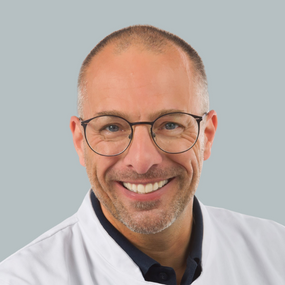
Stellv. Klinikdirektor: Dr. med. Jens Peter Hölzen
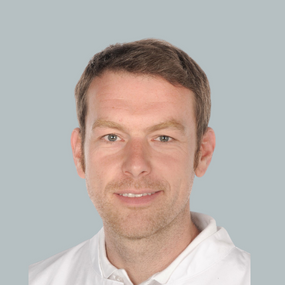
Leitender Oberarzt: PD Dr. med. Benjamin Strücker, FEBS
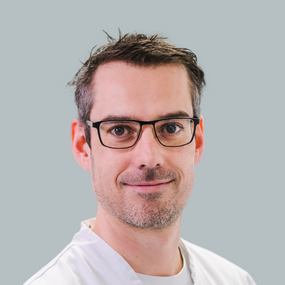
Geschäftsführender Oberarzt: Dr. med. Philipp Houben
Special Clinical Focus
- Tumour surgery (liver, pancreas, oesophagus, stomach, peritoneal carcinomatosis)
- Robotic surgery (pancreas, liver, oesophagus, stomach)
- Neuroendocrine tumours
- Visceral transplant surgery (liver, kidney, pancreas, intestine)
- Second opinion
Medical spectrum
Diseases
- Appendicitis
- Biliary colic
- Cancer of the gallbladder
- Cancer of the large intestine
- Cancer of the pancreas / Pancreatic cancer
- Childhood liver disorders
- Cholangiocarcinoma
- Cholangitis
- Cholestasis
- Cholesystitis
- Cirrhosis of the liver
- Colonic cancer
- Crohn’s disease
- Disorders of the biliary tract
- Duodenal ulcer
- Esophageal cancer
- Esophageal disorder
- Fatty liver
- Gallbladder disorders
- Gallstones
- Gastric cancer
- Hepatic fibrosis
- Hepatitis
- Hepatitis B
- Hepatitis C
- Intestinal polyps
- Jaundice / Icterus
- Liver cancer
- Liver disorders
- Liver failure
- Liver metastases
- Liver tumors (adenoma; FNH, hemangioma)
- Oligometastasis
- Pancreatic diseases
- Pancreatitis
- Paralytic ileus
- Perforations of the gastrointestinal tract
- Peritoneal cancer
- Reflux disease
- Renal cancer
- Richter's hernia
- Short Bowel Syndrome
- Ulcerative colitis
Therapies
- Anti-reflux procedure
- Artificial anus
- Cancer treatment
- Cholecystectomy
- Colorectal surgery
- Endocrine surgery
- Esophageal surgery
- Fundoplication
- Gastric cancer surgery
- Hepatic cancer surgery
- Hepatic metastasis surgery
- Hepatic surgery
- Intestinal cancer surgery
- Intestinal resection
- Intestinal transplantation
- Laparocopic pancreatic surgery
- Large intestine surgery
- Liver resection
- Liver transplantation
- Minimal invasive biliary surgery
- Minimal invasive esophageal surgery
- Minimal invasive intestinal / colorectal surgery
- Minimal invasive liver surgery
- Minimal invasive pancreatic surgery
- Oncology surgery
- Palliative care in colonic carcinoma
- Pancreas transplantation
- Pancreatic cancer surgery
- Pancreatic surgery
- Pancreatitis surgery
- Peritonectomy and HIPEC
- Peritonectomy and HIPEC
- PIPAC
- PTC / Percutaneous transhepatic cholangiography
- Rectal surgery
- Renal transplantation
- Robotic intestine / rectum surgery
- Robotic liver surgery
- Single-port cholycystectomy
- TULC
- Ulcerative colitis surgery
- Vagotomy
Diagnostics
Directions
Plus Code: 9F39XJ52+VF
Universitätsklinikum Münster
Waldeyerstraße 1
48149 Münster
Webseite: www.ukm.de
Call now: +49 251 97159021
Landline at local rates
